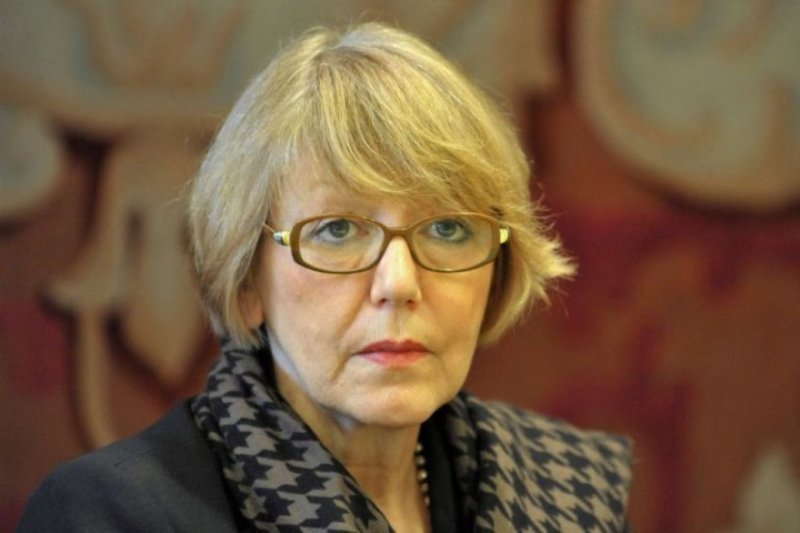Kosovo Remains a High Priority for the West
There have been two important developments on the political scene of Belgrade: President Vucic presented a 7- point plan of measures against Kosovo and the buying of a dozen of French super jets during the recent visit of French President Macron to Belgrade.
They have happened when Brussels has promised to step up efforts for talks between Pristina and Belgrade.
Albanian Daily News talked with the veteran political analyst and President of Helsinki Committee in Serbia Sonja Biserko, asking her first of all which is their impact on the deadlocked talks and the region of the Balkans - its stability:
-Ms. Biserko how do you consider the timing of the two events with the visit of President Macron to Belgrade and Vucic's reconfirmation of strong support for Putin?
-The meetings between Macron and Vucic in a relatively short period are part of Serbia's otherwise intense diplomatic activities this summer. Chancelor Scholz and President Xi also visited Serbia and signed important agreements.
The West perceives these latest arrangements as Serbia's strategic integration into the Western sphere. And they are strategic agreements, if they are realized. Many analysts in the West believe that Vucic has skillfully managed to take advantage of international circumstances and successfully balance between the so-called four pillars of foreign policy. However, the question is how long he will be able to juggle. Already, he faces the dilemma of whether to attend the BRICS summit in Russia.
Military cooperation with NATO is much more intensive than with Russia, which means that Serbia is increasingly aligning both economically and in terms of security with the West. Regarding Belgrade's intense diplomatic activity on the economic and security fronts, several global media outlets have analyzed Vucic's ability to balance between various, at this moment, opposing actors. Some have highlighted that the agreements with Macron and Scholz represent a "European moment" for Serbia, albeit with serious skepticism about the existence of democratic and pro-European forces in Serbia.
-It's too soon to say but please do you think Vucic's behavior is a threat against Pristina and warning to Brussels for his intentions to start implementation of the 7- point plan?
-I understood his last address to the nation quite differently. In his introduction he reminded that Kosovo was only a part of the FRY (Federal Republic of Yugoslavia) and that with its dissolution and the creation of the state union, the final condition for Kosovo's separation was the separation of Montenegro and Serbia.
It is telling how Belgrade reacted to Pristina's move to the Serbian border and the integration of northern Kosovo, which until two years ago was under the control of Belgrade and the Serbian List. Everything boiled down to bitter and toxic rhetoric and the demonization of Kurti. The fact is that Vucic has given up on Kosovo. When one seriously analyzes the negative reactions of citizens, which have been cultivated for decades, it becomes clear that no one seriously considers Kosovo a relevant topic. This narrative is maintained to uphold the claim of the alleged endangerment of Serbs in all neighboring countries, including Kosovo. This narrative serves as a substitute for any serious proposal, whether from the government or the opposition.
-What could you say about the tit-for-tat response of Prime minister Kurti declaring Kosovo is stronger than ever to protect the territorial integrity of Kosovo?
-In my view, Kosovo did what international community failed to do, because all recent Kosovo government moves were agreed many years ago. Dialogue proved to be futile. The focus should be on implementation of agreements – Brussels, Brussels 2 and Ohrid Agreement. Since Kosovo now controls the entire Kosovo territory the responsibility of the Kosovo government, opposition, media and society generally is to embrace the Serb community, show empathy and solidarity. It would be the signal of maturity and wisdom.
-Do you think that what is happening has blown up the EU mediated talks and the situation gets more complicated?
-The dialogue has never been genuine, except at the beginning with the signing of the Brussels Agreement in 2013. The last two agreements were a result of U.S. involvement. In the meantime, the idea of partition was on the table but was later removed by Angela Merkel. This was followed by the COVID pandemic and the Russian aggression in Ukraine.
Kosovo has been, and remains, a high priority for the West, particularly due to security concerns and the region's fragility, along with many pending issues that Russia is skillfully exploiting. The primary Western engagement in the region is security oversight to prevent any escalation. And their focus was mainly on Serbia for many reasons and still is.
After the Banjska incident, there was a strengthening of NATO forces in the region, the construction of new NATO bases in Albania and Romania, as well as increased vigilance from NATO, the CIA, and other security agencies. Serbia is surrounded by NATO countries, and NATO's alertness has increased. The visit of the CIA director (and the NATO Assistant Secretary General), despite the lack of statements regarding the visit in Serbia, clearly had a preventive character. David Kanin, a former CIA analyst and now a professor at Johns Hopkins University, pointed out that the visit was, among other things, aimed at preventing any escalation in the next 70 days, that is, until the U.S. elections.
-Do you see any connection between the timing of Vucic's plan and the feverish armament of Serbia with the last huge deal with France?
-Vucic is under great pressure and control from the West after Banjska and has no opportunity to engage in any military adventures. Vucic's policy in Kosovo has been a complete fiasco, particularly regarding the Serb community. Belgrade's approach has been disastrous, as it systematically removed Serbs from the Kosovo context. Vucic's seven-point proposals are an attempt to bring the Serbs' position in Kosovo back to the negotiating table. He is responsible for preventing the Serbs from standing up for their own interests and negotiating with Prishtina in accordance with the criteria and standards enshrined in Kosovo's Constitution and laws.
In the meantime, the reality has changed: Serbs are leaving Kosovo (as are Albanians), and their numbers are unknown since they did not participate in the census. There is little that Belgrade can do to alter this new reality. But dialogue should be continued as it is the only way to normalize relations of the two countries.
-Lastly how Serb people consider these acts and secondly should such threats unite Kosovo's political elite and the people?
-As I mentioned earlier, it is now Kosovo's turn to demonstrate its commitment to democratic values, pluralism, and the ability to forgive without forgetting. This is the path the region should strive toward.














